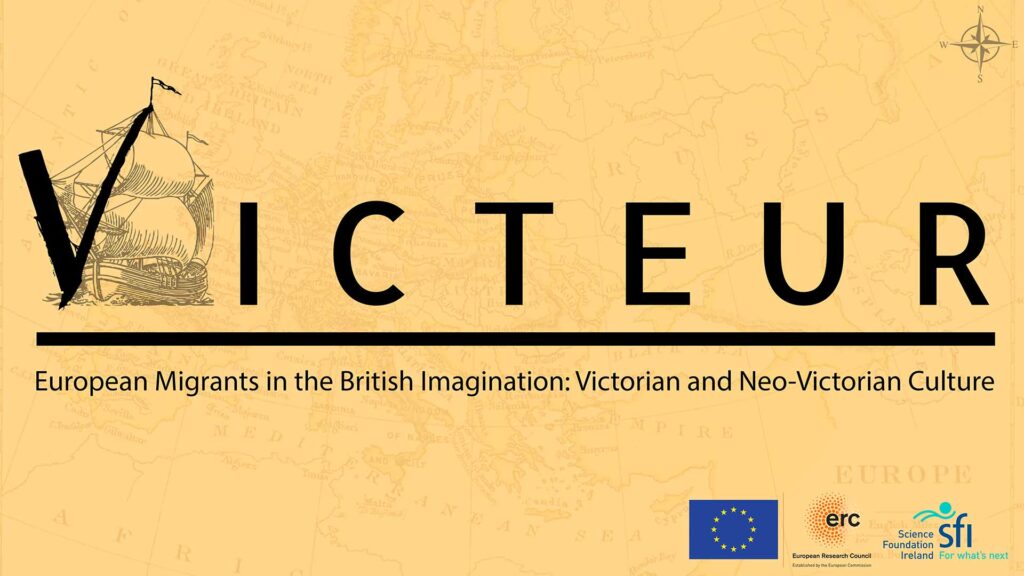V I C T E U R
VICTEUR: European Migrants in the British Imagination: Victorian and Neo-Victorian Culture

The VICTEUR study will combine data analytics and literary criticism to investigate representations of migrants and by migrants in Victorian fiction
Professor Gerardine Meaney (Director of the UCD Centre for Cultural Analytics) is an expert on the application of new digital methodologies to humanities research and also the PI on VICTEUR: European Migrants in the British Imagination: Victorian and Neo-Victorian Culture. The project has been awarded a prestigious European Research Council (ERC) Advanced Grant of €2.5 million for a study focused on migration and culture.
The 5-year study will involve text analysis of nearly 36,000 books, in the British Library Nineteenth Century Corpus, and shared by them in digital format with the research team.
The study will use big data to address a key unanswered societal question, how does migration impact on the cultural identity of both migrant and host communities in the historical long-term.

The Advanced Grant will also result in the establishment of 10 new research positions (PhD students, post-doctoral researchers, a research technologist and a research assistant) at UCD.
Professor Meaney is Professor of Cultural Theory in the UCD School of English, Drama and Film, and the Director of the UCD Centre for Cultural Analytics.
Dr Derek Greene, an Assistant Professor in the UCD School of Computer Science, and an expert in the field of machine learning, is collaborating with Professor Meaney on this study. Dr Greene is also a Funded Investigator at the Insight SFI Research Centre for Data Analytics at UCD, which will provide computational support for the project.
Victorian Britain was much more diverse than we assume today. It was the target destination for large numbers of migrants from across Europe fleeing war, political turmoil and economic deprivation.
The VICTEUR study will combine data analytics and literary criticism to investigate representations of migrants and by migrants in Victorian fiction. The primary Victorian case studies will be Irish, Italian and Eastern European Jewish migrants. The study will also analyse continuities and changes in the representation of migration in neo-Victorian global transmedia in the 21st century.
While Britain provides a fascinating example, the aim of the study is to develop a new transhistorical and intra-national model for understanding migration as a key driver of cultural development at the interface of gender, ethnicity and demography.
“I am delighted to have been awarded this ERC Advanced Grant which will allow me and the team to identify the long term impact of immigration on Victorian culture and the influence of Victorian attitudes in the 21st century. The project will address these questions through analysis of a very large scale dataset, but it is ultimately concerned with the potential of literature to create a shared culture, to allow us to re-imagine and re-write the stories we tell ourselves about who we were, who we are and who we might become.”
Professor Gerardine Meaney, UCD School of English, Drama and Film
Professor Meaney is one of 185 top researchers and scientists from across Europe, who between them will receive ERC Advanced Grants worth a total of €450 million, as part of the Horizon 2020 research and innovation programme. This funding will give recipients the opportunity to build up their teams and have far-reaching impact.

Dr Derek Greene, UCD School of Computer Science, said, “As part of this study, we will apply text mining methods to study a corpus consisting of nearly 36,000 digitised books from the British Library, using UCD’s Curatr natural language processing platform. Based on these analyses, the project will then trace the residual impact of these cultural representations in modern neo-Victorian fiction, film, and television, by combining methodologies from data science, digital humanities, and cultural memory studies.”
Professor Meaney added, “The project will also examine in detail the relationship between gender and national and ethnic identities within the texts and the impact of authorial gender on representations of migrants by British and migrant writers.”
ERC Advanced Grants are awarded under the ‘excellent science pillar’ of Horizon 2020 and awardees are exceptional leaders in their field with track records of significant research achievements in the last ten years.
